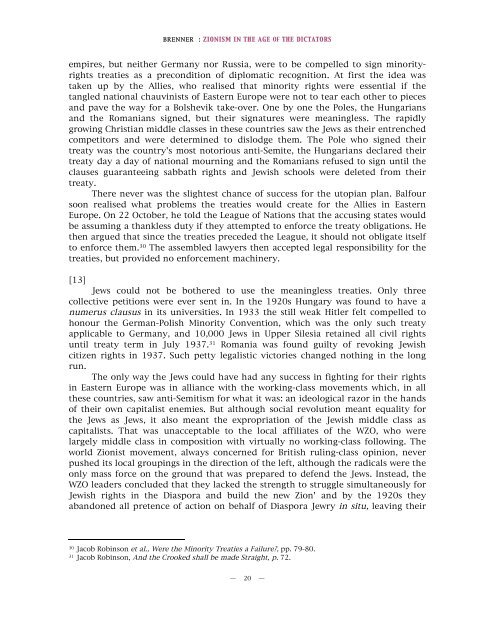Create successful ePaper yourself
Turn your PDF publications into a flip-book with our unique Google optimized e-Paper software.
BRENNER : <strong>ZIONISM</strong> <strong>IN</strong> <strong>THE</strong> <strong>AGE</strong> <strong>OF</strong> <strong>THE</strong> <strong>DICTATORS</strong><br />
empires, but neither Germany nor Russia, were to be compelled to sign minorityrights<br />
treaties as a precondition of diplomatic recognition. At first the idea was<br />
taken up by the Allies, who realised that minority rights were essential if the<br />
tangled national chauvinists of Eastern Europe were not to tear each other to pieces<br />
and pave the way for a Bolshevik take-over. One by one the Poles, the Hungarians<br />
and the Romanians signed, but their signatures were meaningless. The rapidly<br />
growing Christian middle classes in these countries saw the Jews as their entrenched<br />
competitors and were determined to dislodge them. The Pole who signed their<br />
treaty was the country's most notorious anti-Semite, the Hungarians declared their<br />
treaty day a day of national mourning and the Romanians refused to sign until the<br />
clauses guaranteeing sabbath rights and Jewish schools were deleted from their<br />
treaty.<br />
There never was the slightest chance of success for the utopian plan. Balfour<br />
soon realised what problems the treaties would create for the Allies in Eastern<br />
Europe. On 22 October, he told the League of Nations that the accusing states would<br />
be assuming a thankless duty if they attempted to enforce the treaty obligations. He<br />
then argued that since the treaties preceded the League, it should not obligate itself<br />
to enforce them. 30 The assembled lawyers then accepted legal responsibility for the<br />
treaties, but provided no enforcement machinery.<br />
[13]<br />
Jews could not be bothered to use the meaningless treaties. Only three<br />
collective petitions were ever sent in. In the 1920s Hungary was found to have a<br />
numerus clausus in its universities. In 1933 the still weak Hitler felt compelled to<br />
honour the German-Polish Minority Convention, which was the only such treaty<br />
applicable to Germany, and 10,000 Jews in Upper Silesia retained all civil rights<br />
until treaty term in July 1937. 31 Romania was found guilty of revoking Jewish<br />
citizen rights in 1937. Such petty legalistic victories changed nothing in the long<br />
run.<br />
The only way the Jews could have had any success in fighting for their rights<br />
in Eastern Europe was in alliance with the working-class movements which, in all<br />
these countries, saw anti-Semitism for what it was: an ideological razor in the hands<br />
of their own capitalist enemies. But although social revolution meant equality for<br />
the Jews as Jews, it also meant the expropriation of the Jewish middle class as<br />
capitalists. That was unacceptable to the local affiliates of the WZO, who were<br />
largely middle class in composition with virtually no working-class following. The<br />
world Zionist movement, always concerned for British ruling-class opinion, never<br />
pushed its local groupings in the direction of the left, although the radicals were the<br />
only mass force on the ground that was prepared to defend the Jews. Instead, the<br />
WZO leaders concluded that they lacked the strength to struggle simultaneously for<br />
Jewish rights in the Diaspora and build the new Zion' and by the 1920s they<br />
abandoned all pretence of action on behalf of Diaspora Jewry in situ, leaving their<br />
30 Jacob Robinson et al., Were the Minority Treaties a Failure?, pp. 79-80.<br />
31 Jacob Robinson, And the Crooked shall be made Straight, p. 72.<br />
— 20 —


